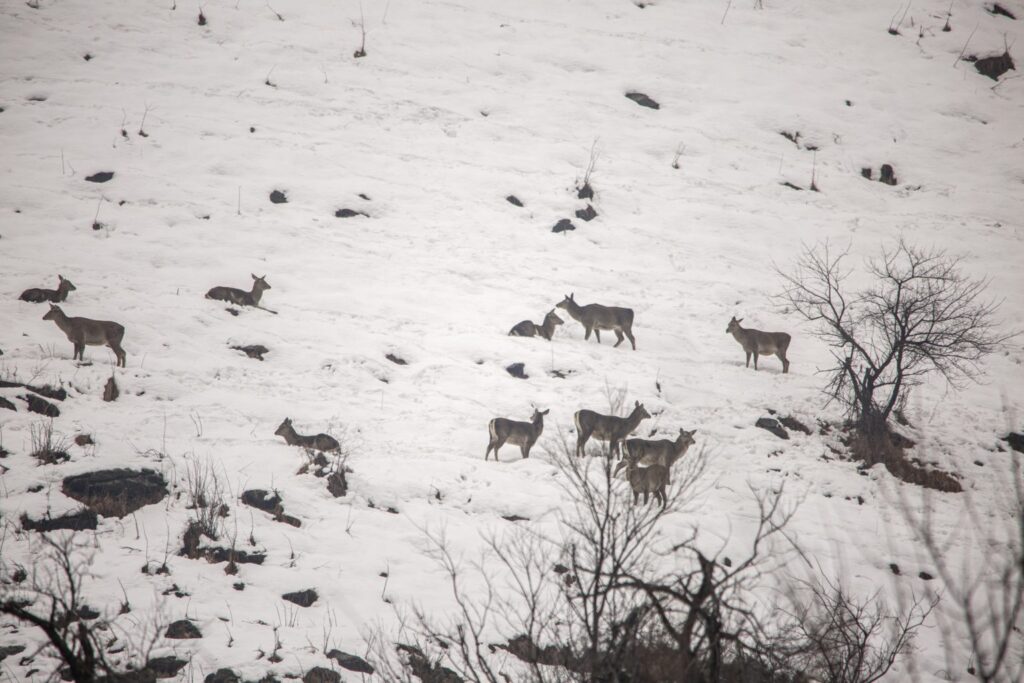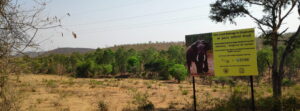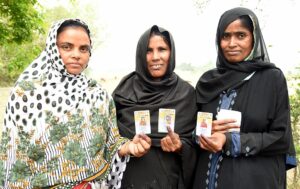Kashmir: Hangul Population Could Go Extinct

Hangul near Dachigam National Park in Kashmir (Photo by Mohammad Dawood/Mongabay)
- A long-term study of the hangul population in and around the Dachigam National Park confirms that despite protection, the species has been unable to increase its numbers.
- The hangul population in and around Dachigam National Park is the only viable population of the species in the Dachigam landscape. The species is critically endangered and likely to go extinct without intervention.
- The researchers recommend conservation actions such as monitoring calf survival, removing feral dogs, reducing livestock presence for habitats to recuperate and the population to recover and restocking the hangul in existing suitable habitats.
New evidence from 19 years of monitoring the hangul, or Kashmir stag’s population, within Dachigam National Park, reveals that despite protection, the species has been unable to increase its numbers. A population viability analysis conducted by the researchers found that further population decrease is likely.
“Although the survey methods need significant improvement, demographic parameters derived from monitoring data do suggest that this population is on the brink of extinction,” Stefano Focardi, one of the study authors, told Mongabay-India.
The main objective of the study based on the long-term monitoring of the species, was to create realistic predictions of hangul population growth, given its unique evolutionary status and conservation challenges.
Red deer is a widespread deer species globally but is locally extinct in Albania and Ireland. The red deer remain severely threatened in several other countries. The hangul, which gets its name from its preferred food, the Indian horse chestnut (locally known as Han Doon), is the only surviving subspecies of red deer in the Indian subcontinent. It is also genetically unique.
“The hangul was previously assumed to be an eastern subspecies of the European red deer. Recent genetic studies, however, have shown that it is a subspecies of the Tarim red deer, together with the Yarkand or Tarim deer and Bukhara deer. The conservation status of these populations is uncertain. Therefore, it is important that we conserve the species,” explains Focardi.
289 Hangul In Dachigam Landscape
The hangul (Cervus hanglussp.hanglu) is critically endangered, according to the IUCN. Once widespread in the mountains of Kashmir, parts of Chamba district of Himachal Pradesh and Pakistan, its population declined from 5,000 in 1900 to 2,000 in 1947, notes the study, though precise estimates of the population are lacking.
An annual survey conducted by the Department of Wildlife Protection, Government of Jammu and Kashmir in March this year, found that the hangul numbers in and around Dachigam National Park, which has the only viable population of hangul in that landscape, had risen marginally, from 237 in 2019 and 261 in 2021 to 289 in 2023 (including 14 individuals in Shikargarh, known to be the second home of the hangul). The survey report indicates that while the hangul population is stable, there is no considerable improvement in the population in this region. This is because of reasons such as habitat fragmentation and poaching, livestock grazing, ecological threats, predation, disturbed corridors and landscapes and low genetic variability in the population.
“The species is under threat based on the vulnerability of population with respect to population viability, population structure, dwindling population, habitat vulnerability and possibility of inbreeding. The species needs considerable immediate global attention,” the March survey report said.
“Over the years, the hangul has been given the highest levels of protection in India. It is listed as a Schedule I species under the Indian Wildlife (Protection) Act and is fully protected within Dachigam National Park. It is also listed among species of high conservation priority by the Government of India,” says Ajay Singh, a Kashmir-based independent wildlife researcher who works in collaboration with the Department of Wildlife Protection for hangul conservation in Kashmir.
Intervention Needed To Prevent Extinction
To provide insights for conservation planning, researchers of the long-term monitoring study, which was published in August this year, monitored the hangul in Dachigam for over 19 years (January 2001 to March 2020). A population viability analysis was performed to assess the risk of the current population going extinct. To account for the uncertainties of demographic processes in small populations, both deterministic and stochastic formulations were used and multiple scenarios were developed.
The study found that the hangul population in Dachigam is likely to go extinct without intervention. The sex ratio is skewed towards females, indicating high mortality of adult males. Calf mortality has also increased and any further reduction could lead to extinction, the study found.
“I’m very worried about the declining calf-to-hind ratio, which could soon lead to a population collapse. The other problem is livestock competition in the summer and in general poaching due to the presence of military and insurgents,” Focardi told Mongabay-India. The small population size, low genetic variability, and fragmented range may also be trapping the hangul in an extinction vortex.
The Road Ahead
“Any deer species, when present in large numbers, becomes an important source of food for predators. On the other hand, it also shapes the landscape by differential grazing and plays the role of ecological engineers. But people overlook the problem of conservation of the whole ecosystem,” Focardi adds.
The researchers recommend a slew of conservation actions such as monitoring calf survival and removing feral dogs. There’s also a need to reduce livestock presence in Dachigam and surrounding areas, which would allow habitats to recuperate and the population to recover.
The small population size and the large fluctuations in demographic parameters suggest that restocking the hangul in existing suitable habitats within the species’ historical range is essential, notes the study. “This would require a breeding centre and the selection of appropriate restocking areas. Shikargah Conservation Reserve would be a good candidate for restocking, as it houses the only conservation breeding centre for the hangul and still hosts a wild population of 10-15 individuals, which range between the contiguous Shikargah and Overa-Aru Wildlife Sanctuaries,” it says. Overa-Aru Wildlife Sanctuary in the Lidder Valley is largely free from anthropogenic influences and its topography, climate and vegetation are similar to those of Dachigam National Park, write the authors. “In addition, there is a corridor connecting Overa-Aru Wildlife Sanctuary with Dachigam National Park, which would be beneficial for establishing a second viable hangul population.”
There have been, separately, institutional efforts towards conservation breeding, conservation genetics, and community development but those efforts have not show any significant impact on the hangul population as yet.
(Published under Creative Commons from Mongabay-India. Read the original article here)





